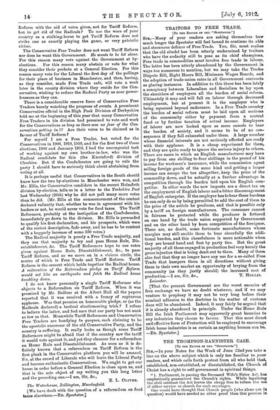TRAITORS TO FREE TRADE.
[To THE EDITOR 07 THE "SPECTATOR."] Sis,—Many of your readers are asking themselves how much longer the Spectator will feel bound to continue its able and strenuous defence of Free Trade. You, Sir, must realize that the old citadel has been. utterly undermined by traitors who have the audacity still to pose as its chief champions. Free trade in commodities must involve free trade in labour. The latter has been utterly abandoned by the Government in ways too numerous to mention, but we may take the Trades Dispute Bill, Eight Hours Bill, Minimum Wages Boards, and the adoption of trade-union rates in all Government contracts as glaring instances. In addition to this there has been lately a conspiracy between Liberalism and Socialism to lay upon the shoulders of employers all the burden of social reform. Ultimately it may and will fall on labour through decreased employment, but at present it is the employer who is being squeezed beyond endurance. In a Free Trade country, the burden of social reform must be laid upon all sections of the community either by payment from a central fund or by further taxation of actual income. Employers of labour are now looked upon as mere camels to bear the burden of society, and it seems to be of no con- sequence if they fall exhausted under them. A large number whose financial interests are not seriously affected are ready with their applause. It is a cheap experiment for them, and they are quite ready to ignore the serious injury to others. There are cases in which an English manufacturer may have to pay from one shilling to four shillings in the pound of his income for workmen's insurance, while the commission agent selling foreign goods of the same kind and getting a larger income can escape the tax altogether, keep the price of the commodity down, and be actually at a further advantage in competition through the burden laid upon his English com- petitor. In other words the new imposts are a direct tax on the employment of English labour and a bitter discouragement of English enterprise. If the employer has to bear these burdens he can only do so by being permitted to add the cost of them to the price of the article he produces, and that is possible only by a tariff on foreign manufacturers. The consumer cannot in fairness be protected while the producer is fettered on one hand by the trade union supported by Government and on the other hand by keen competition of the foreigner. There are, no doubt, some fortunate manufacturers whose margins may still enable them to bear cheerfully the addi- tional burden, and this cheerfulness is more noticeable when they are bound hand and foot by party ties. But the great majority of all those engaged in production feel very keenly the gross injustice that is being dealt out to them. Many of them also feel that they no longer have any use for a so-called Free Trade that hampers them in all directions without giving them in their own market an opportunity of levying from the community (as they justly should) the increased cost of That the present Government are the worst enemies of free exchange we have no doubt whatever, and if we may venture to prophesy it may not be very long before their nominal adhesion to the doctrine in the matter of customs dues will be abandoned. Indeed, it may fairly be argued that it is already abandoned in principle. Under the Home Rule Bill the Irish Parliament may apparently grant bounties to any industries they choose to favour. That this most direct and effective form of Protection will be employed to encourage Irish home industries is as certain as anything human can be. —ED. Spectator.]


















































 Previous page
Previous page